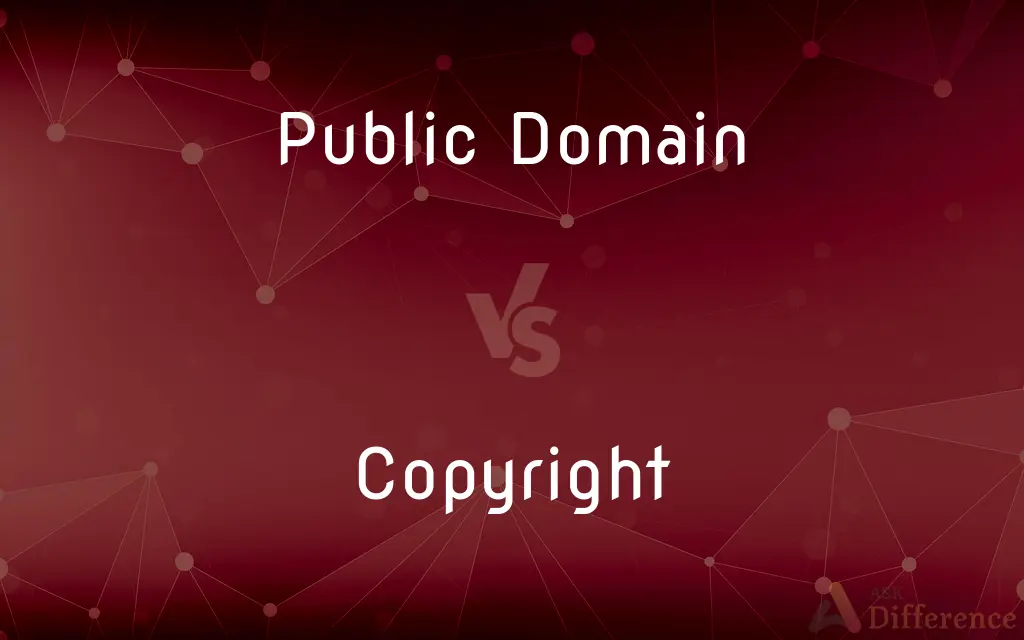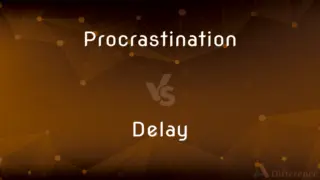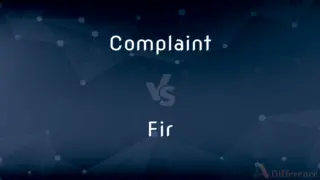Public Domain vs. Copyright — What's the Difference?
By Tayyaba Rehman & Fiza Rafique — Published on October 3, 2023
Public Domain refers to creative works that are not protected by intellectual property laws and are freely available to everyone. Copyright is a legal right that grants the creator of an original work exclusive rights to its use and distribution.

Difference Between Public Domain and Copyright
Table of Contents
ADVERTISEMENT
Key Differences
Public Domain is a term used to describe works that are not subject to intellectual property rights. These works are freely available for use by anyone for any purpose. Copyright, on the other hand, refers to the legal protections granted to the creators of original works, which often include the exclusive right to reproduce, distribute, and display their creations.
Public Domain works may include those for which copyright has expired, or those that were never copyrighted in the first place. People can freely modify, distribute, and perform these works without seeking permission. In contrast, copyrighted works require explicit permission from the rights holder for various kinds of usage, including reproduction and public performance.
The entry of a work into the Public Domain often depends on various factors, such as the death of the author plus a certain number of years, typically 70. Copyright usually begins the moment an original work is created and fixed in a tangible medium, and it lasts for a certain period depending on various factors, including the type of work and jurisdiction.
Public Domain is crucial for the free dissemination of knowledge, allowing educational institutions, artists, and the general public to use works without restriction. Copyright, meanwhile, incentivizes creators by giving them exclusive control over their works, thereby encouraging more creative output. Both Public Domain and Copyright are essential components of intellectual property law, each serving different but complementary roles.
Comparison Chart
Legal Protection
None
Granted by law
ADVERTISEMENT
Usage Permission
Not required
Required from rights holder
Time Duration
Infinite
Limited
Alteration of Work
Allowed
Requires permission
Ownership
Owned by the public
Owned by creator or rights holder
Compare with Definitions
Public Domain
Works free from intellectual property rights
Shakespeare's plays are in the Public Domain.
Copyright
Legal right to control original works
The author holds the Copyright to the book.
Public Domain
Works for which copyright has expired
This classical music composition has entered the Public Domain.
Copyright
Exclusive rights to reproduce a work
The artist copyrighted her painting to prevent unauthorized reproductions.
Public Domain
Items free for public use and distribution
Public Domain software can be freely shared and modified.
Copyright
Control over distribution and public performance
Copyright law prevents you from streaming the movie without permission.
Public Domain
Content that anyone can use
This image is in the Public Domain, so you can use it freely.
Copyright
Intellectual property protection
The film is under Copyright, so you can't distribute it.
Public Domain
Material not copyrighted
These government documents are usually in the Public Domain.
Copyright
A form of ownership for creators
The song's Copyright belongs to the musician.
Copyright
The legal right granted to an author, composer, playwright, publisher, or distributor to exclusive publication, production, sale, or distribution of a literary, musical, dramatic, or artistic work.
Copyright
Of or relating to a copyright
Copyright law.
A copyright agreement.
Copyright
Protected by copyright
Permission to publish copyright material.
Copyright
To secure a copyright for.
Copyright
(uncountable) The right by law to be the entity which determines who may publish, copy and distribute a piece of writing, music, picture or other work of authorship.
Copyright is a separate legal area from trademarks.
Copyright
(countable) Such an exclusive right as it pertains to one or more specific works.
The artist lost the copyrights to her songs when she signed the contract.
The images are still copyright of the original artist.
Copyright
A violation of copyright law; copyright infringement.
Copyright
To obtain or secure a copyright for some literary or other artistic work.
Copyright
The right of an author or his assignee, under statute, to print and publish his literary or artistic work, exclusively of all other persons. This right may be had in maps, charts, engravings, plays, and musical compositions, as well as in books.
Copyright
To secure a copyright on.
Copyright
A document granting exclusive right to publish and sell literary or musical or artistic work
Copyright
Secure a copyright on a written work;
Did you copyright your manuscript?
Common Curiosities
What is Copyright?
Copyright is a legal right granting exclusive use and distribution to the creator.
Do you need permission to use Copyrighted works?
Yes, you must obtain permission to use copyrighted works.
What is Public Domain?
Public Domain refers to works that are not protected by intellectual property laws.
Can anyone use Public Domain works?
Yes, works in the Public Domain are free for public use.
How long do Public Domain works last?
Works in the Public Domain are free to use indefinitely.
Who owns works in the Public Domain?
Public Domain works are owned by the public.
Do Copyrighted works have legal protection?
Yes, Copyright provides legal protections for the creator.
How do works enter the Public Domain?
Works enter the Public Domain when copyright expires or if they were never copyrighted.
How long does Copyright last?
Copyright duration varies, but it is limited.
Can you modify Public Domain works?
Yes, works in the Public Domain can be altered and used freely.
Can you modify Copyrighted works?
No, modification of copyrighted works requires permission.
Who owns Copyrighted works?
Copyrighted works are owned by the creator or rights holder.
Do Public Domain works have legal protection?
No, Public Domain works are not legally protected.
What is the purpose of Public Domain and Copyright?
Public Domain encourages free dissemination of knowledge, while Copyright encourages creative output by granting exclusivity.
How are works copyrighted?
Works are copyrighted when they are created and fixed in a tangible medium.
Share Your Discovery

Previous Comparison
Procrastination vs. Delay
Next Comparison
Complaint vs. FIRAuthor Spotlight
Written by
Tayyaba RehmanTayyaba Rehman is a distinguished writer, currently serving as a primary contributor to askdifference.com. As a researcher in semantics and etymology, Tayyaba's passion for the complexity of languages and their distinctions has found a perfect home on the platform. Tayyaba delves into the intricacies of language, distinguishing between commonly confused words and phrases, thereby providing clarity for readers worldwide.
Co-written by
Fiza RafiqueFiza Rafique is a skilled content writer at AskDifference.com, where she meticulously refines and enhances written pieces. Drawing from her vast editorial expertise, Fiza ensures clarity, accuracy, and precision in every article. Passionate about language, she continually seeks to elevate the quality of content for readers worldwide.
















































